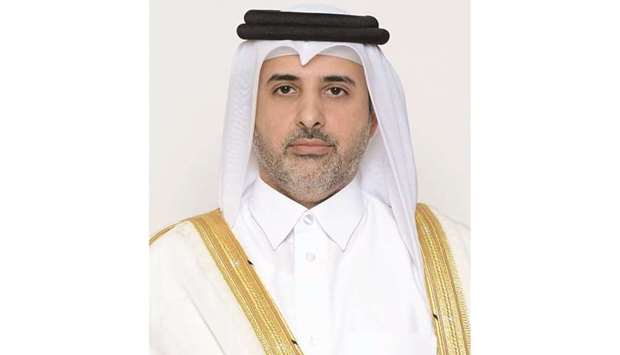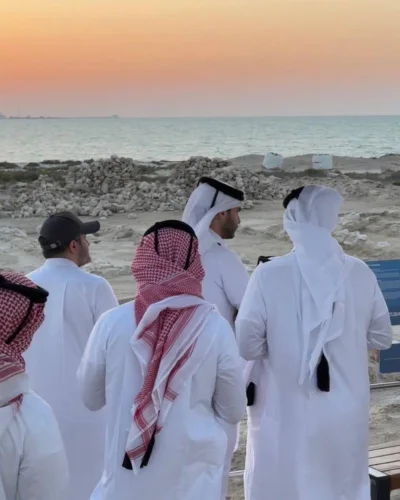HE the Minister of Municipality and Environment Abdullah bin Turki al-Subaie underlined Qatar's keenness to be an active partner in the international collective work system to combat desertification and drought.
Marking the World Day to Combat Desertification, which falls on June 17 each year, HE the Minister said that the challenges of desertification and drought can be overcome or their impacts can be mitigated through international cooperation, under the umbrella of the international multilateral environmental agreements and the adoption of strategies and action plans.
He noted that Qatar, stemming from its belief in the importance of addressing the effects of desertification and its global dimensions, has joined the United Nations Convention to Combat Desertification since 1999, which aims to combat desertification and mitigate the effects of drought within the framework of an integrated approach that contributes to achieving sustainable development.
HE the Minister praised the role carried out by the Global Dryland Alliance, an initiative put forward by His Highness the Amir Sheikh Tamim bin Hamad al-Thani in his speech before the United Nations in 2014.
The Alliance aims at exploring ways to address the challenges arising from certain phenomena such as climate change and desertification.
For his part, the Ministry's Assistant Undersecretary for Environmental Affairs Eng.
Hassan Juma Bojumhur al-Mohannadi said that the theme of the World Day to Combat Desertification 2021 "Restoration. Land. Recovery. We build back better with healthy land", highlights the issue of land reclamation and linking it to the concept of recovery from the Covid-19 pandemic.
He noted that his ministry has been keen on considering the environmental aspect of the lands on which development projects are taking place in the country, as well as the ecosystems they contain.
He added that work is still underway to develop a national framework to combat desertification in Qatar, based on the principles of sustainable development and capacity-building in a way that ensures that the necessary measures are taken to protect the lands and develop plans to combat desertification and drought at all levels, whether national, regional or international.
In addition to the initiative launched by the Ministry of Municipality and Environment to plant 1mn trees in the country, the initiative to establish a green belt around the city of Doha and its suburbs, which was identified by the Second National Development Strategy, would contribute to reducing the effects of the factors causing desertification such as dust-laden winds and sand encroachment, al-Mohannadi explained.
The ministry's Environmental Affairs Sector is making outstanding efforts to combat desertification, through the implementation of a number of programs, initiatives and projects related to studying the ban on grazing on vegetation and preserving it, and working to rehabilitate meadows and cultivate the Qatari land with plants from the Qatari environment, in addition to launching programs and initiatives to reduce desertification, such as the project to protect endangered lands, planting one mn trees, and the program to ban camel grazing, as well as joining the United Nations Convention to Combat Desertification.
In this context, the Director of the Department of Environmental Protection, Natural Reserves and Wildlife Taleb Khalid Al Shahwani underlined the ministry's keenness on celebrating the World Day to Combat Desertification with the aim of developing the measures of protecting and restoring natural ecosystems, especially in light of the coronavirus pandemic and the restrictions it imposed on the world as a whole.
He noted that the ministry has paid great attention to environmental issues, preserving vegetation, and the rehabilitate and cultivating of the Qatari land, noting that the farming projects which the Ministry has listed among its priorities and strategies represent a pioneering step towards a sustainable Qatari environment.
He referred to the decision of HE the Minister of Municipality and Environment No.(7) of 2021 to form a working group for the rehabilitation of the Qatari mainland, which led to great results in the protection and rehabilitation of meadows.
He revealed that a five-year plan is being developed for the working group, in which the scientific foundations for the rehabilitation process are laid and priorities are set to achieve environmental sustainability, in light of the expansion and acceleration of infrastructure projects accompanying the preparations for the World Cup Qatar 2022.
Al Shahwani noted the establishment of a Field Gene Bank for wild and local plants, as well as a global field genetic bank which is prepared to protect species from extinction due to overgrazing or harsh climatic conditions such as drought and high temperatures.
The number of plant species that have been preserved so far is approximately 130 wild and fungal plants.(QNA)
Marking the World Day to Combat Desertification, which falls on June 17 each year, HE the Minister said that the challenges of desertification and drought can be overcome or their impacts can be mitigated through international cooperation, under the umbrella of the international multilateral environmental agreements and the adoption of strategies and action plans.
He noted that Qatar, stemming from its belief in the importance of addressing the effects of desertification and its global dimensions, has joined the United Nations Convention to Combat Desertification since 1999, which aims to combat desertification and mitigate the effects of drought within the framework of an integrated approach that contributes to achieving sustainable development.
HE the Minister praised the role carried out by the Global Dryland Alliance, an initiative put forward by His Highness the Amir Sheikh Tamim bin Hamad al-Thani in his speech before the United Nations in 2014.
The Alliance aims at exploring ways to address the challenges arising from certain phenomena such as climate change and desertification.
For his part, the Ministry's Assistant Undersecretary for Environmental Affairs Eng.
Hassan Juma Bojumhur al-Mohannadi said that the theme of the World Day to Combat Desertification 2021 "Restoration. Land. Recovery. We build back better with healthy land", highlights the issue of land reclamation and linking it to the concept of recovery from the Covid-19 pandemic.
He noted that his ministry has been keen on considering the environmental aspect of the lands on which development projects are taking place in the country, as well as the ecosystems they contain.
He added that work is still underway to develop a national framework to combat desertification in Qatar, based on the principles of sustainable development and capacity-building in a way that ensures that the necessary measures are taken to protect the lands and develop plans to combat desertification and drought at all levels, whether national, regional or international.
In addition to the initiative launched by the Ministry of Municipality and Environment to plant 1mn trees in the country, the initiative to establish a green belt around the city of Doha and its suburbs, which was identified by the Second National Development Strategy, would contribute to reducing the effects of the factors causing desertification such as dust-laden winds and sand encroachment, al-Mohannadi explained.
The ministry's Environmental Affairs Sector is making outstanding efforts to combat desertification, through the implementation of a number of programs, initiatives and projects related to studying the ban on grazing on vegetation and preserving it, and working to rehabilitate meadows and cultivate the Qatari land with plants from the Qatari environment, in addition to launching programs and initiatives to reduce desertification, such as the project to protect endangered lands, planting one mn trees, and the program to ban camel grazing, as well as joining the United Nations Convention to Combat Desertification.
In this context, the Director of the Department of Environmental Protection, Natural Reserves and Wildlife Taleb Khalid Al Shahwani underlined the ministry's keenness on celebrating the World Day to Combat Desertification with the aim of developing the measures of protecting and restoring natural ecosystems, especially in light of the coronavirus pandemic and the restrictions it imposed on the world as a whole.
He noted that the ministry has paid great attention to environmental issues, preserving vegetation, and the rehabilitate and cultivating of the Qatari land, noting that the farming projects which the Ministry has listed among its priorities and strategies represent a pioneering step towards a sustainable Qatari environment.
He referred to the decision of HE the Minister of Municipality and Environment No.(7) of 2021 to form a working group for the rehabilitation of the Qatari mainland, which led to great results in the protection and rehabilitation of meadows.
He revealed that a five-year plan is being developed for the working group, in which the scientific foundations for the rehabilitation process are laid and priorities are set to achieve environmental sustainability, in light of the expansion and acceleration of infrastructure projects accompanying the preparations for the World Cup Qatar 2022.
Al Shahwani noted the establishment of a Field Gene Bank for wild and local plants, as well as a global field genetic bank which is prepared to protect species from extinction due to overgrazing or harsh climatic conditions such as drought and high temperatures.
The number of plant species that have been preserved so far is approximately 130 wild and fungal plants.(QNA)



